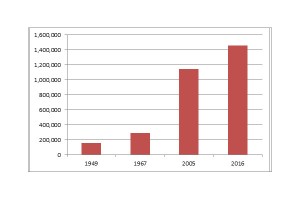Behind the Headlines: Facts and Figures – Islam in Israel

Freedom of religion is a core value of the Israeli democracy
• Israel is home to 1,454,000 Muslim citizens who enjoy full civil liberty and political freedom.
• Hebrew and Arabic are the official languages of the State of Israel.
• Most Arab citizens of Israel are Muslims, mainly Sunnis. Other branches of Islam in Israel include: Shia, Alawite, Ahmadiyeh, Sufi and Shazaliyeh. Islam is the second biggest religion in Israel after Judaism.
• Jews account for 75.4 percent of the population, Muslims make up 16.9 percent, Christians 2.10 percent, Druze 1.70 percent and the rest of the population identifies otherwise, including a small Baha’i community.

• The Muslim population of Israel has increased about ten-fold since the State was established; from some 156,000 in 1949 to over 1,454,000 today.
Muslim Population Growth

• Approximately 300 imams and muezzins receive their salaries from the Israeli government. Israel provides the Korans used in mosques and funds Arab schools and many Islamic schools and colleges. Such schools teach Islamic studies and Arabic, as well as the Israel Ministry of Education’s general curriculum.
• In 2015, the Israeli government approved a 10-15 billion NIS budget (about 2.6-4 billion USD) for a five-year plan to develop the Arab sector in Israel.
• The Muslim community regulates its own unique court system and handles marriage and divorce under Islamic law. Eight regional Islamic law courts and one national appeals court operate in Israel, under the supervision of Israel’s Ministry of Justice.
• Muslims are highly involved in Israeli academia, with some 26,000 Muslim students enrolled in Israeli academic institutions. In 2014, about 21 percent of the undergraduate students at the prestigious Technion – Israel Institute of Technology in Haifa were Arabs, up from 11 percent in 2001. This is roughly the same proportion of Arabs as in Israel’s overall population of 8.3 million.
• Some Muslims also serve in the Israel Defense Forces; approximately 1,700 Muslims served in 2015, mostly from Bedouin tribes.
• Most of Israel’s Muslim citizens, some 69 percent, live in the northern part of the country, i.e. the Galilee and Haifa. About 20 percent live in and around Jerusalem and 11 percent of Israel’s Muslims are Bedouins that live mostly in the south of Israel, near Be’er Sheva in the Negev.
• Each year the Jerusalem municipality decorates the streets of the city in celebration of the Muslim holiday of Ramadan, and hosts dozens of festivities and events for the public.
• The municipality also marks the holiday with a traditional ceremony in which a shot is fired from a historical cannon in East Jerusalem each day at sunrise and sunset to mark the beginning and end of the daily fast.
• Muslim employees can take days off work during Ramadan, and working conditions are tailored to their needs while fasting during the month. The Israel Defense Forces also adjust Muslim soldiers’ training regimes during the month of Ramadan.

• The Museum for Islamic Art in Jerusalem contains one of the most impressive archives of Islamic art in the world, while the Islamic Museum on the Temple Mount in the Old City of Jerusalem boasts 600 copies of the Koran from various periods.

• The umbrella organization Interreligious Coordinating Council in Israel, or ICCI, has for nearly three decades run programs that foster dialogue, education and mutual understanding among various members of the religious communities in Israel. It is comprised of over 70 Muslim, Christian, and Jewish institutions, including Jewish-Arab coexistence organizations, universities, museums, and various ecumenical organizations.



This Post Has One Comment
Steve you make a good apologist for the State of Israel. Unlike Jesus you could never say they turn the other cheek.
STEVE RAY HERE:
Not sure where to begin with such confusion.
First of all my article has nothing to do turning another cheek or whether I am or am not in agreement with the state of Israel and its policies.
Second, one needs to understand how Jesus taught using rabbinic hyperbole. He also said you should cut off your right hand and pluck out your eye and I don’t see many Christians doing that.
Third, when he speaks of turning the other cheek he’s instructing an individual Christian and his attitude and in no way imposing that upon a state which is in charge of protecting its borders and its people.
Saint Paul says in Romans 13 that the state does not bear the sword in vain and that God gave that authority to the state. The state of Israel has a right and obligation to protect its borders and its people just like any other country does.
Comments are closed.